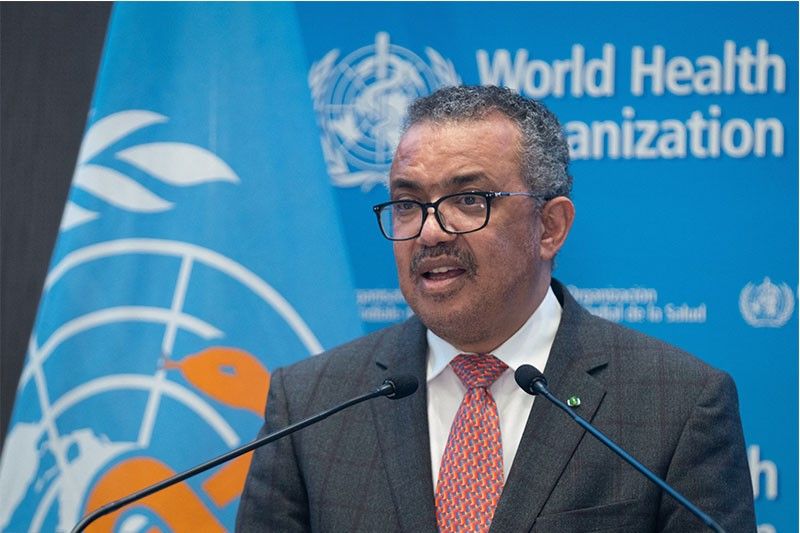WHO warns world creating 'toxic' recipe for new variants

GENEVA, Switzerland — The WHO warned Wednesday that the world was creating toxic conditions for new Covid-19 variants like Omicron to emerge and then spread around the globe.
The World Health Organization said the combination of low vaccination coverage across the planet, mixed with very low testing to track the virus, was a fertile breeding ground.
The UN health agency stressed that measures to stop the globally-dominant Delta variant would also hinder Omicron.
The new variant of concern has rattled countries around the world.
"We need to use the tools we already have to prevent transmission and save lives from Delta. And if we do that, we will also prevent transmission and save lives from Omicron," WHO director general Tedros Adhanom Ghebreyesus told a press conference.
"But if countries and individuals don't do what they need to do to stop transmission of Delta, they won't stop Omicron either.
"Globally, we have a toxic mix of low vaccine coverage, and very low testing — a recipe for breeding and amplifying variants.
"That's why we continue to urge countries to... ensure equitable access to vaccines, tests and therapeutics all over the world."
Omicron in 23 countries
Omicron was first reported to the WHO from South Africa on November 24, while the first known laboratory-confirmed case was identified from a specimen collected on November 9.
The Netherlands said Tuesday it had found the variant in two samples taken on November 19 and 23, one having recently been to southern Africa and the other having no travel history.
Maria Van Kerkhove, the WHO's Covid-19 technical lead, said timelines around first detections of Omicron may change as there was a backlog of sequencing of cases that occurred in November.
Tedros said the WHO was taking the emergence of Omicron "extremely seriously", but added that the mutation "should not surprise us. This is what viruses do.
"And it's what this virus will continue to do, as we long as we allow it to continue spreading."
Tedros said Omicron was in at least 23 countries — with that number expected to grow.
Van Kerkhove said the WHO was not yet aware of any deaths associated with Omicron.
Transmissibility studies
The WHO said it could take several weeks to complete studies of Omicron to see if there are any changes in transmissibility, severity or implications for Covid vaccines, tests and treatments.
"We expect to have more information on transmission within days: not necessarily weeks, but in days," said Van Kerkhove.
"The more this virus circulates, the more infections there will be. The more infections there will be, the more people will die, and this is something that can be prevented."
Several countries have imposed travel bans on flights from South Africa, which Van Kerkhove said was making it difficult to send samples from the country, even though they were willing to share them.
Van Kerkhove said: "We will get out of this pandemic but every day decisions need to be made on whether or not we're getting closer to the end of this pandemic or we're actually taking steps to prolong it."
Michael Ryan, the WHO's emergencies director, said it was not the time for governments to be passing responsibility for management of the pandemic over to their citizens.
"Certainly we are dealing with a crisis now: that crisis is in Europe, and it's being driven by the Delta variant," he said.
Follow this page for updates on the new COVID-19 variant, dubbed Omicron and originally detected in South Africa. Photo courtesy of the The STAR/Miguel de Guzman
The EU's drug regulator is expected to authorise the first Covid-19 vaccines for the Omicron variant, although they do not target the latest strains.
The adapted vaccines made by Pfizer/BioNTech and Moderna will be discussed during an extraordinary meeting of the European Medicines Agency (EMA).
European nations have been keen to rush through the new generation of jabs so they can start booster campaigns ahead of a feared Covid surge this winter.
The two so-called "bivalent" vaccines protect against the earlier BA.1 strain of Omicron, as well as the original Covid virus that emerged in China in 2019. — AFP
The Department of Health says an emerging Omicron subvariant, BA 2.75, had been detected in two individuals from Western Visayas.
The Department of Health confirms the detection of the COVID-19 Omicron subvariant BA.5 in the Philippines.
The DOH says two individuals from the same household in Central Luzon tested posiive with the subvariant.
Both patients have unknown exposure and have no travel history.
The first cases of Omicron BA.2.12.1 COVID-19 variant have been detected in the National Capital Region and Palawan, the Department of Health says.
The first two cases in NCR have both received their booster shot and are now tagged as asymptomatic and recovered after completing home isolation.
Meanwhile, 14 tourists and 1 local tested positive in Puerto Princesa City on April 29. All cases are now asymptomatic.
North Korea on Thursday confirms its first-ever case of Covid-19, with state media calling it a "severe national emergency incident" after more than two years of keeping the pandemic at bay.
The official KCNA news agency says the case was "consistent with" the virus' highly transmissible Omicron variant. — AFP
- Latest
- Trending




































